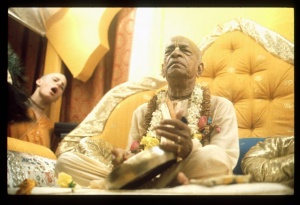CC Madhya 9.116 (1975): Difference between revisions
(Vanibot #0027: CCMirror - Mirror CC's 1996 edition to form a basis for 1975) |
(Vanibot #0020: VersionCompareLinker - added a link to the Version Compare feature) |
||
| Line 2: | Line 2: | ||
<div style="float:left">'''[[Sri Caitanya-caritamrta (1975)|Śrī Caitanya-caritāmṛta (1975)]] - [[CC Madhya (1975)|Madhya-līlā]] - [[CC Madhya 9 (1975)|Chapter 9: Lord Śrī Caitanya Mahāprabhu's Travels to the Holy Places]]'''</div> | <div style="float:left">'''[[Sri Caitanya-caritamrta (1975)|Śrī Caitanya-caritāmṛta (1975)]] - [[CC Madhya (1975)|Madhya-līlā]] - [[CC Madhya 9 (1975)|Chapter 9: Lord Śrī Caitanya Mahāprabhu's Travels to the Holy Places]]'''</div> | ||
<div style="float:right">[[File:Go-previous.png|link=CC Madhya 9.115 (1975)|Madhya-līlā 9.115]] '''[[CC Madhya 9.115 (1975)|Madhya-līlā 9.115]] - [[CC Madhya 9.117 (1975)|Madhya-līlā 9.117]]''' [[File:Go-next.png|link=CC Madhya 9.117 (1975)|Madhya-līlā 9.117]]</div> | <div style="float:right">[[File:Go-previous.png|link=CC Madhya 9.115 (1975)|Madhya-līlā 9.115]] '''[[CC Madhya 9.115 (1975)|Madhya-līlā 9.115]] - [[CC Madhya 9.117 (1975)|Madhya-līlā 9.117]]''' [[File:Go-next.png|link=CC Madhya 9.117 (1975)|Madhya-līlā 9.117]]</div> | ||
{{CompareVersions|CC|Madhya 9.116|CC 1975|CC 1996}} | |||
{{RandomImage}} | {{RandomImage}} | ||
==== TEXT 116 ==== | ==== TEXT 116 ==== | ||
| Line 25: | Line 24: | ||
<div class="translation"> | <div class="translation"> | ||
"Since Kṛṣṇa and Nārāyaṇa are the same personality, Lakṣmī's association with Kṛṣṇa does not break her vow of chastity. Rather, it was in great fun that the goddess of fortune wanted to associate with Lord Kṛṣṇa." | |||
</div> | </div> | ||
| Line 32: | Line 31: | ||
<div class="purport"> | <div class="purport"> | ||
This is | This is an answer to Lord Śrī Caitanya Mahāprabhu's question, and from this we can understand that Veṅkaṭa Bhaṭṭa knew the truth. He told Śrī Caitanya Mahāprabhu that Nārāyaṇa is a form of Kṛṣṇa associated with transcendental opulence. Although Kṛṣṇa is two-armed and Nārāyaṇa four-armed, there is no difference in the person. They are one and the same. Nārāyaṇa is as beautiful as Kṛṣṇa, but Kṛṣṇa's pastimes are more sportive. It is not that the sportive pastimes of Kṛṣṇa make Him different from Nārāyaṇa. Lakṣmī's desiring to associate with Kṛṣṇa was perfectly natural. In other words, it is understandable that a chaste woman wants to associate with her husband in all his different dresses. Therefore one should not criticize Lakṣmī for wanting to associate with Kṛṣṇa. | ||
</div> | </div> | ||
Latest revision as of 20:32, 27 January 2020

A.C. Bhaktivedanta Swami Prabhupada
TEXT 116
- tāra sparśe nāhi yāya pativratā-dharma
- kautuke lakṣmī cāhena kṛṣṇera saṅgama
SYNONYMS
tāra sparśe—by the touching of Kṛṣṇa by Lakṣmī; nāhi—does not; yāya—disappear; pati-vratā-dharma—the vow of chastity; kautuke—in great fun; lakṣmī—the goddess of fortune; cāhena—wants; kṛṣṇera—of Lord Kṛṣṇa; saṅgama—association.
TRANSLATION
"Since Kṛṣṇa and Nārāyaṇa are the same personality, Lakṣmī's association with Kṛṣṇa does not break her vow of chastity. Rather, it was in great fun that the goddess of fortune wanted to associate with Lord Kṛṣṇa."
PURPORT
This is an answer to Lord Śrī Caitanya Mahāprabhu's question, and from this we can understand that Veṅkaṭa Bhaṭṭa knew the truth. He told Śrī Caitanya Mahāprabhu that Nārāyaṇa is a form of Kṛṣṇa associated with transcendental opulence. Although Kṛṣṇa is two-armed and Nārāyaṇa four-armed, there is no difference in the person. They are one and the same. Nārāyaṇa is as beautiful as Kṛṣṇa, but Kṛṣṇa's pastimes are more sportive. It is not that the sportive pastimes of Kṛṣṇa make Him different from Nārāyaṇa. Lakṣmī's desiring to associate with Kṛṣṇa was perfectly natural. In other words, it is understandable that a chaste woman wants to associate with her husband in all his different dresses. Therefore one should not criticize Lakṣmī for wanting to associate with Kṛṣṇa.